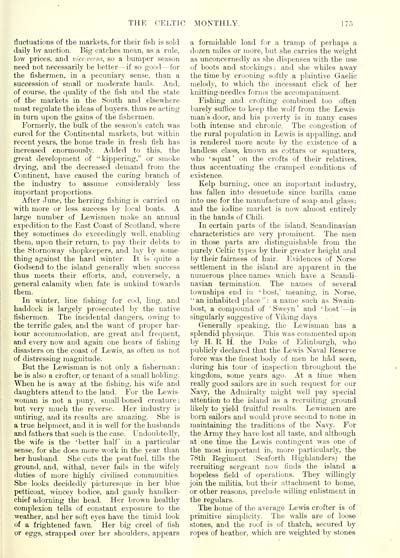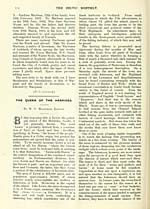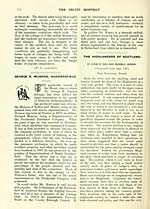Blair Collection > Celtic monthly > Volume 5, 1897
(249)
Download files
Complete book:
Individual page:
Thumbnail gallery: Grid view | List view

THE CELTIC MONTHLY.
fluctuations of the markets, for their fish is sold
daily by auction. Big catches mean, as a rule,
low prices, and vice-ivisn, so a bumper season
need not necessarily be better — if so good — for
the fishermen, in a pecuniary sense, than a
succession of small or moderate hauls. And,
of course, the quality of the fish and the state
of the markets in the South and elsewhere
must regulate the ideas of buyers, thus re-acting
in turn upon the gains of the fishermen.
Formerly, the bulk of the season's catch was
cured for the Continental markets, but within
recent years, the home trade iu fresh fish has
increased enormously. Added to this, the
great development of " kippering," or smoke
drying, and the decreased demand from the
Continent, have caused the curing branch of
the industry to assume considerably less
important proportions.
After June, the herring fishing is carried on
with more or less success by local boats. A
large number of Lewismen make an annual
expedition to the East Coast of Scotland, where
they sometimes do exceedingly well, enabling
them, upon their return, to pay their debts to
the Stornoway shopkeepers, and lay by some-
thing against the hard winter. It is Cjuite a
Godsend to the island generally when success
thus meets their efibrts, and, conversely, a
general calamity when fate is unkind towards
them.
In winter, line fishing for cod, ling, and
haddock is largely prosecuted by the native
fishermen. The incidental dangers, owing to
the terrific gales, and the want of proper har-
bour accommodation, are great and frequent,
and everj' now and again one hears of fishing
disasters on the coast of Lewis, as often as not
of distressing magnitude.
But the Lewisman is not only a fisherman :
he is also a crofter, or tenant of a small holding.
When he is away at the fishing, his wife and
daughters attend to the land. For the Lewis
woman is not a puny, small-boned creature ;
but very much the reverse. Her industry is
untiring, and its results are amazing. She is
a true helpmeet, and it is well for the husbands
and fathers that such is the case. I'ndoubtedly,
the wife is the 'better half in a particular
sense, for she does more work iu the year than
her husband. She cuts the peat fuel, tills the
ground, and, withal, never fails in the wifely
duties of more highly civilised communities.
She looks decidedly picturesque in her blue
petticoat, wincey bodice, and gaudy handker-
chief adorning the head. Her brown healthy
complexion tells of constant exposure to the
weather, and her soft eyes have the timid look
of a frightened fawn. Her big creel of fish
or eggs, strapped over her shoulders, appears
a formidable load for a tramp of perhaps a
dozen miles or njore, but she carries the weight
as unconcernedly as she dispenses with the use
of boots and stockings ; and she whiles away
the time by crooning softly a plaintive Gaelic
melody, to which the incessant click of her
knitting-needles forms the accompaniment.
Fishing and crofting combined too often
barely suffice to keep the wolf from the Lewis-
man's door, and his puverty is in many cases
l)oth intense and chronic. The congestion of
the rural population in Lewis is appalling, and
is rendered more acute by the existence of a
landless class, known as cottars or squatters,
who ' squat ' on the crofts of their relatives,
thus accentuating the cramped conditions of
existence.
Kelp burnmg, once an important industry,
has fallen into desuetude since barilla came
into use for the manufacture of soap and glass;
and the iodine mai-ket is now almost entirely
in the hands of Chili.
In certain parts of the island, Scandinavian
characteristics are very pi-omiuent. The men
in those parts are distinguishable from the
purely Celtic types by their greater height and
by their fairness of hair. Evidences of Norse
settlement iu the island are apparent in the
numerous place-names wnich have a Scandi-
navian termination. The names of several
townships end iu 'host,' meaning, in Norse,
" an inhabited place " : a name such as Swain-
bost, a compound of ' Sweyn ' and ' bost ' — is
singularly suggestive of Viking days
(Generally speaking, the Lewisman has a
splendid physique. This was commented upon
by H. R H. the Duke of Edinburgh, who
publicly declared that the Lewis Naval Reserve
force was the finest body of men he had seen,
during his tour of inspection throughout the
kingdom, some years ago. At a time when
really good sailors are iu such recjuest for our
Navy, the Admiralty might well pay special
attention to the island as a recruiting ground
Ukely to yield fruitful results. Lewismen are
born sailors and would prove second to none in
maintaining the traditions of the Navy. For
the Army they have lost all taste, and although
at one time the Lewis contingent was one of
the most important in, more particularly, the
78th Regiment ;Seaforth Highlanders) the
recruiting sergeant now finds the island a
hopeless field of operations. They willingly
join the militia, but their attachment to home,
or other reasons, preclude willing enlistment in
the regulars.
The home of the average Lewis crofter is of
primitive simplicity. The walls are of loose
stones, and the roof is of thatch, secured by
ropes of heather, which are weighted by stones
fluctuations of the markets, for their fish is sold
daily by auction. Big catches mean, as a rule,
low prices, and vice-ivisn, so a bumper season
need not necessarily be better — if so good — for
the fishermen, in a pecuniary sense, than a
succession of small or moderate hauls. And,
of course, the quality of the fish and the state
of the markets in the South and elsewhere
must regulate the ideas of buyers, thus re-acting
in turn upon the gains of the fishermen.
Formerly, the bulk of the season's catch was
cured for the Continental markets, but within
recent years, the home trade iu fresh fish has
increased enormously. Added to this, the
great development of " kippering," or smoke
drying, and the decreased demand from the
Continent, have caused the curing branch of
the industry to assume considerably less
important proportions.
After June, the herring fishing is carried on
with more or less success by local boats. A
large number of Lewismen make an annual
expedition to the East Coast of Scotland, where
they sometimes do exceedingly well, enabling
them, upon their return, to pay their debts to
the Stornoway shopkeepers, and lay by some-
thing against the hard winter. It is Cjuite a
Godsend to the island generally when success
thus meets their efibrts, and, conversely, a
general calamity when fate is unkind towards
them.
In winter, line fishing for cod, ling, and
haddock is largely prosecuted by the native
fishermen. The incidental dangers, owing to
the terrific gales, and the want of proper har-
bour accommodation, are great and frequent,
and everj' now and again one hears of fishing
disasters on the coast of Lewis, as often as not
of distressing magnitude.
But the Lewisman is not only a fisherman :
he is also a crofter, or tenant of a small holding.
When he is away at the fishing, his wife and
daughters attend to the land. For the Lewis
woman is not a puny, small-boned creature ;
but very much the reverse. Her industry is
untiring, and its results are amazing. She is
a true helpmeet, and it is well for the husbands
and fathers that such is the case. I'ndoubtedly,
the wife is the 'better half in a particular
sense, for she does more work iu the year than
her husband. She cuts the peat fuel, tills the
ground, and, withal, never fails in the wifely
duties of more highly civilised communities.
She looks decidedly picturesque in her blue
petticoat, wincey bodice, and gaudy handker-
chief adorning the head. Her brown healthy
complexion tells of constant exposure to the
weather, and her soft eyes have the timid look
of a frightened fawn. Her big creel of fish
or eggs, strapped over her shoulders, appears
a formidable load for a tramp of perhaps a
dozen miles or njore, but she carries the weight
as unconcernedly as she dispenses with the use
of boots and stockings ; and she whiles away
the time by crooning softly a plaintive Gaelic
melody, to which the incessant click of her
knitting-needles forms the accompaniment.
Fishing and crofting combined too often
barely suffice to keep the wolf from the Lewis-
man's door, and his puverty is in many cases
l)oth intense and chronic. The congestion of
the rural population in Lewis is appalling, and
is rendered more acute by the existence of a
landless class, known as cottars or squatters,
who ' squat ' on the crofts of their relatives,
thus accentuating the cramped conditions of
existence.
Kelp burnmg, once an important industry,
has fallen into desuetude since barilla came
into use for the manufacture of soap and glass;
and the iodine mai-ket is now almost entirely
in the hands of Chili.
In certain parts of the island, Scandinavian
characteristics are very pi-omiuent. The men
in those parts are distinguishable from the
purely Celtic types by their greater height and
by their fairness of hair. Evidences of Norse
settlement iu the island are apparent in the
numerous place-names wnich have a Scandi-
navian termination. The names of several
townships end iu 'host,' meaning, in Norse,
" an inhabited place " : a name such as Swain-
bost, a compound of ' Sweyn ' and ' bost ' — is
singularly suggestive of Viking days
(Generally speaking, the Lewisman has a
splendid physique. This was commented upon
by H. R H. the Duke of Edinburgh, who
publicly declared that the Lewis Naval Reserve
force was the finest body of men he had seen,
during his tour of inspection throughout the
kingdom, some years ago. At a time when
really good sailors are iu such recjuest for our
Navy, the Admiralty might well pay special
attention to the island as a recruiting ground
Ukely to yield fruitful results. Lewismen are
born sailors and would prove second to none in
maintaining the traditions of the Navy. For
the Army they have lost all taste, and although
at one time the Lewis contingent was one of
the most important in, more particularly, the
78th Regiment ;Seaforth Highlanders) the
recruiting sergeant now finds the island a
hopeless field of operations. They willingly
join the militia, but their attachment to home,
or other reasons, preclude willing enlistment in
the regulars.
The home of the average Lewis crofter is of
primitive simplicity. The walls are of loose
stones, and the roof is of thatch, secured by
ropes of heather, which are weighted by stones
Set display mode to: Large image | Transcription
Images and transcriptions on this page, including medium image downloads, may be used under the Creative Commons Attribution 4.0 International Licence unless otherwise stated. ![]()
| Early Gaelic Book Collections > Blair Collection > Celtic monthly > Volume 5, 1897 > (249) |
|---|
| Permanent URL | https://digital.nls.uk/75853733 |
|---|
| Shelfmark | Blair.57 |
|---|---|
| Additional NLS resources: | |
| Attribution and copyright: |
|
| Description | A selection of books from a collection of more than 500 titles, mostly on religious and literary topics. Also includes some material dealing with other Celtic languages and societies. Collection created towards the end of the 19th century by Lady Evelyn Stewart Murray. |
|---|
| Description | Selected items from five 'Special and Named Printed Collections'. Includes books in Gaelic and other Celtic languages, works about the Gaels, their languages, literature, culture and history. |
|---|

